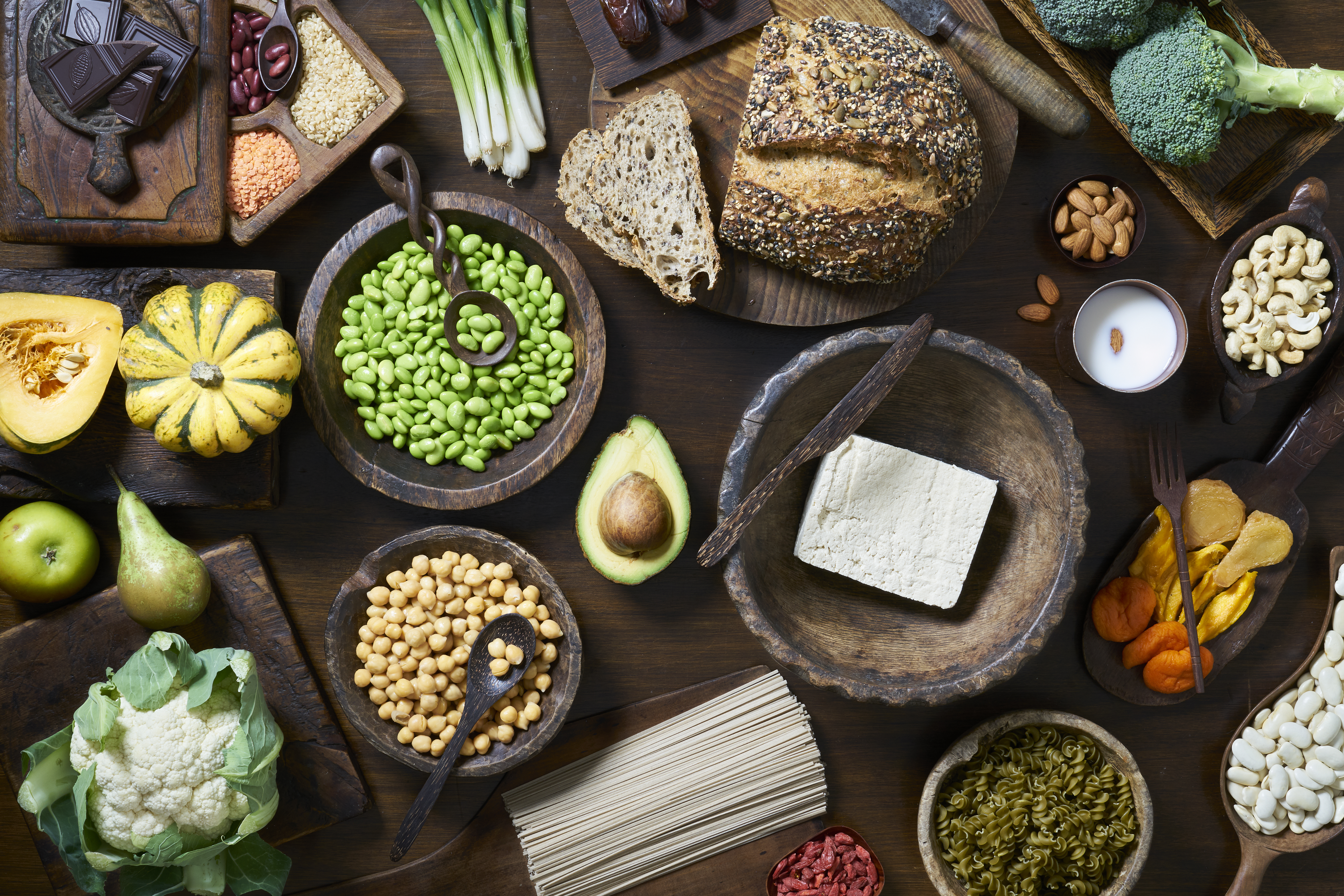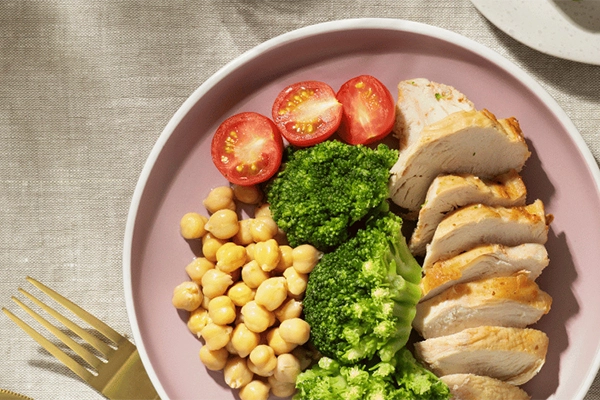Topics
Why do I need protein?
Protein is a macronutrient that is essential for maintaining our cellular structure, muscle growth and repair, and regulating fluid balance in our body. Proteins also make enzymes responsible for several chemical reactions.
Protein helps to prevent overeating by making us feel fuller or satiated for longer. As a result, we consume less calories overall, which eventually aids in maintaining a healthy weight.
How much protein do I need?
According to the Recommended Nutrient Intake of Malaysia, protein requirement for an average Malaysian adult is 10-20% of total energy intake.
An average Malaysian adult needs 1 gram of protein per kilogramme of body weight per day. For example, if Mr. Lee is 75kg, he needs 75g of protein daily to meet his dietary protein needs.
However, dietary protein intake also depends on your lifestyle and needs.
- Do you lead an active lifestyle?
- Are you planning on losing weight or building muscle mass?
- Do you have any medical condition?
- Are you a bodybuilder?
If your answer is yes to the any of the questions above, your protein intake needs will be higher.
Here are some guidelines regarding incorporating protein into your daily diet:
- Choose lean meat such as chicken breast and fish, as they are wonderful sources of protein. 100g of chicken breast gives you 31g of protein, whereas 100g of salmon has 22g of protein.
- Spice your steamed chicken up with herbs like paprika, turmeric, parsley, etc.
- Incorporate healthy cooking methods when you prepare your meals. Avoid fried proteins and opt for steamed or grilled proteins.
- Limit consumption of processed protein foods with high amount of sodium, saturated fats, and trans-fat such as processed, canned, and cured meat. These foods can raise your blood pressure level and increase your risk of heart disease.
- Consume red meat such as beef, lamb, duck in moderation, as excessive intake of red meat can increase the risk of developing colon cancer.
Generally, we can meet our daily protein intake requirements without additional sources of protein. Therefore, if you are thinking of adding protein supplementation, do consult a doctor or dietitian. A balanced diet of whole, natural, and unprocessed food should be your priority.
Can you eat too much protein?
Yes, you can! Too much of a good thing can also be bad. Exceeding your recommended intake can lead to weight gain, kidney stones, bad breath, and gout in the long run.
Consuming high amounts of red meat and saturated fat increases the risk of breast cancer, prostate cancer, and colon cancer as well as heart disease.
Animal protein vs plant-based protein
Our body requires 20 types of essential amino acids (building blocks for proteins). Some are produced in our bodies, and the rest are sourced from our diet.
Our dietary protein intake derives from two main sources: animal proteins and plant-based proteins.
- Animal protein: fish, poultry, meat, egg, milk
- Plant-based protein: beans, lentils, peas, cereals, nuts, soy products

Animal protein contains a complete set of amino acids whereas most plant-based proteins are incomplete proteins and contain smaller amounts of proteins compared to animal proteins. However, legumes have complete protein. Legumes include peas, lentils, beans, chickpea, lima beans, soybeans, and peanut.
A plant-based protein can be converted into a complete protein, if two plant-based proteins are added together. Such as consuming legume and grains or legumes and nuts/seeds. Hence, if you are vegan or vegetarian, you should consume a wide variety of plant-based proteins.
Make an appointment at Pantai Hospitals
A nutritious and balanced diet is crucial for us. Nourishing ourselves with the right balance of nutrients is key to keeping ourselves happy and healthy.
If you have questions about how to identify the different types of proteins and ensure having adequate nutrition in your daily diet, contact the team of dietitians at your nearest Pantai Hospital to receive professional dietary advice to help kickstart your health journey.
To make an appointment for health screening, please contact the health screening centre at the Pantai Hospital nearest to you.
Pantai Hospitals have been accredited by the Malaysian Society for Quality in Health (MSQH) for its commitment to patient safety and service quality.
References
- Recommended Nutrient Intakes (RNI) for Malaysia 2017. Available at https://nutrition.moh.gov.my/wp-content/uploads/2017/05/FA-Buku-RNI.pdf [Accessed on 30 August 2022]
- Gluconeogenesis and energy expenditure after a high-protein, carbohydrate-free diet. Available at https://pubmed.ncbi.nlm.nih.gov/19640952/ [Accessed on 30 August 2022]
- A high-protein diet for reducing body fat: mechanisms and possible caveats. Available at https://www.ncbi.nlm.nih.gov/pmc/articles/PMC4258944/ [Accessed on 30 August 2022]
- Effect of overfeeding macronutrients on day-to-day food intake in man. Available at https://pubmed.ncbi.nlm.nih.gov/8862477/ [Accessed on 30 August 2022]
- Consumption of red and processed meat and breast cancer incidence: A systematic review and meta-analysis of prospective studies. Available at https://onlinelibrary.wiley.com/doi/full/10.1002/ijc.31848 [Accessed on 30 August 2022]
- Prostate Cancer Incidence is Correlated to Total Meat Intake – a Cross-National Ecologic Analysis of 172 Countries. Available at https://www.ncbi.nlm.nih.gov/pmc/articles/PMC6171413/ [Accessed on 30 August 2022]
- When it comes to protein, how much is too much? Available at https://www.health.harvard.edu/nutrition/when-it-comes-to-protein-how-much-is-too-much [Accessed on 30 August 2022]
- The Role of the Anabolic Properties of Plant- versus Animal-Based Protein Sources in Supporting Muscle Mass Maintenance: A Critical Review. Available at https://www.ncbi.nlm.nih.gov/pmc/articles/PMC6723444/ [Accessed on 30 August 2022]








.webp?sfvrsn=9f42ecac_9)
.webp?sfvrsn=2984d0c3_9)



